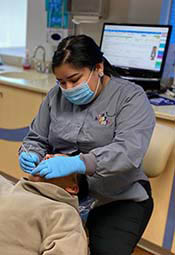Prevent a major oral health problem before it starts. You have probably heard a lot about tooth decay in the past, but how big a problem is it really? Just consider some of the potential consequences:
- Persistent bad breath that other people notice
- Oral pain that affects sleep, study, appetite, and productivity
- Inflammation and irritation of the gums
- Tooth loss leading to alignment issues
- Health problems in the rest of the body, some potentially severe
Tips for a Better Smile: How to Prevent Tooth Decay
As you can see, tooth decay is a major problem that’s hard to ignore. Treatment options are available, but as with any health issue, prevention is the best medicine. Learn how to prevent tooth decay and ensure the long-term health of your teeth, gums, and smile.
Brush and Floss on a Regular Schedule
The single best way to discourage decay is to brush your teeth at least twice a day and to floss at least once. Ideally, you would do both after every meal. Use a toothpaste that contains fluoride, and ask your dentist to recommend a brand that provides maximum protection. If you can’t brush/floss after a meal, at least rinse your mouth out with water to wash away particles that can cause decay.
For more information about flossing and brushing, check out our blog articles: How to Properly Brush Your Teeth Step by Step and The Importance of Dental Flossing on a Daily Basis.
Consider a Mouth Rinse
Some people are at a higher risk of tooth decay, either because of genetic factors or because of a poor oral health routine in the past. A dentist may recommend that those patients use a mouth rinse that contains fluoride in addition to brushing and flossing.
Investigate Dental Sealants
A dental sealant is a plastic coating that is applied to the chewing surface of the teeth. The sealant does not change the look or feel of the teeth, but it does prevent materials that cause decay from collecting in the cracks and crannies of the teeth. One application can last up to 10 years. Currently, the Centers for Disease Control recommends that all school age children get sealants.
Drink More Tap Water
It’s good for your health generally to drink more water, and it’s not necessary to avoid tap water. As you have probably figured out, fluoride is instrumental for preventing tooth decay. Since fluoride is added to all municipal water supplies, drinking tap water actually gives you extra power to fight decay.
Watch Your Diet
Some foods are especially bad for your teeth. Salty snacks and sweet treats often get stuck on your teeth in hard to reach places and contribute directly to decay. Other snacks like fresh fruits and vegetables, sugar-free gum, and unsweetened tea increase the flow of saliva and help your mouth naturally cleanse itself.
It Takes a Dentist to Spot Signs of Decay
Even if you follow all these preventative measures, you will need to regularly see a dentist for dental services such as a deep cleaning and a check-up for early signs of decay. This is essential even if your teeth look and feel great. If it has been too long since you visited the doctor, make an appointment on your schedule at MyOrthodontist Location closest to you.


